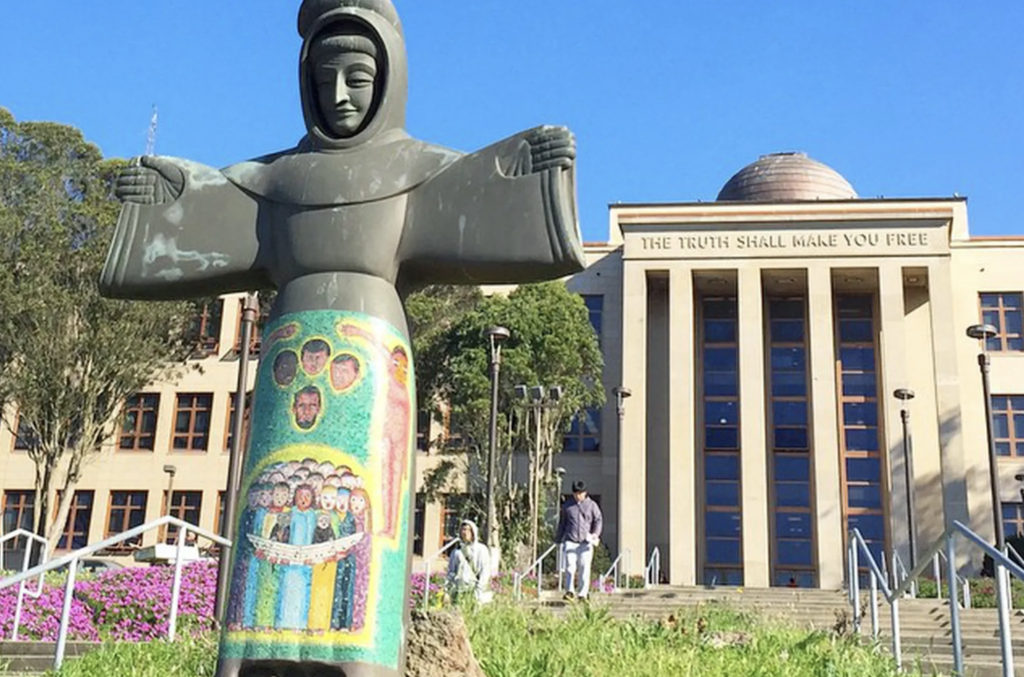City College of San Francisco, one of the City’s most beloved institutions, is again under attack. After facing the loss of accreditation in 2012, a revolving door of chancellors, and drastic class cuts, safe, adequate access to the school is now at risk.
Claiming that it will make Frida Kahlo Way, the main thoroughfare to CCSF, safer and more convenient, SFMTA is proposing a “Quick Build Project.”
Quick-Build projects are part of SFMTA’s Vision Zero Program and are intended for streets on San Francisco’s Vision Zero High Injury Network. SFMTA describes them as projects that can are “reversible, adjustable traffic safety improvements that can be installed relatively quickly…”

The proposed Frida Kahlo Way Quick Build Project is much more than that. It is a major reconfiguration of the street. A two-way bikeway would replace existing parking, and bus stops would relocate from the curb to new transit boarding islands in traffic lanes.
SFMTA claims the project will make the street safer and more convenient for cyclists, pedestrians, buses, and cars. But safety data provided by the agency shows that Frida Kahlo Way is not a High Injury Corridor. The project was planned by SFMTA with little input from the CCSF community. It will reduce bus stops, eliminate parking, disrupt traffic, create congestion in the neighborhood, and expose more cyclists to a dangerous intersection at Ocean Avenue.
This is the same misguided agency that added center-lane bike lanes on Valencia Street that many cyclists hate; created a Quick Build project on Geary Boulevard that threatens the viability of the business corridor; and decimated Taraval Street during a torturously slow construction project. Why should it be trusted to do what’s right for the City College community?
Since the plan was first rolled out last summer, there has been a growing storm of protest objecting to this project. Most recently, the CCSF Board of Trustees passed a resolution opposing the plan “…unless and until there are amendments to the plan that resolve the concerns raised by members of the CCSF community …”
The Trustees have joined students, faculty, staff, and other community members who have voiced their opposition to the project. And a growing number of people are signing an on-line petition opposing the project. Yet, the agency is determined to move forward. SFMTA Engineering on Feb. 23 approved the project to advance to the SFMTA Board of Directors for a final vote that could happen as soon as mid-April.
The plan must be redrawn. According to Madeline Mueller, long time CCSF faculty member serving for more than 50 years on the college’s Facilities Master Planning Committees:
The SFMTA proposal to drastically re-engineer City College’s major thoroughfare, Frida Kahlo Way, is a total design disaster. It supposedly will protect bicyclists and thousands of students/pedestrians while improving public transit stops and reduce the need for cars. But it fails on all counts! Instead, every group listed is placed in increased danger from the badly conceived and drawn plans.
Many CCSF students depend on their cars so they can travel between jobs, home, and classes. They require parking. The loss of street parking in the proposed plan may seem nominal, but in combination with the loss of 1,100 parking spaces in the Lower Balboa Reservoir Lot for the construction of the Balboa Reservoir Residential Project it will result in loss of access to affordable educational opportunity for students from throughout the city and beyond.
Biking to school doesn’t work for all students. While public transit is efficient for many, depending on where you live the commute time to the college can be unrealistic. And this proposal doesn’t include increasing frequency on lines serving the college or free Muni passes for students.
Additionally, there are several large construction projects planned for both sides of Frida Kahlo Way, including the Performing Arts Education Center, a CCSF Garage and the Lower Balboa Reservoir project, that will reveal the changes needed to Frida Kahlo Way and adjacent streets.
CCSF HEAT (“Higher Education Action Team”), a group of students, faculty and community members, recommends that SFMTA work with CCSF to coordinate altering Frida Kahlo Way in view of this current and future construction. Implementing the proposed project now is unnecessary and disrupts safe shared traffic patterns. It must not go forward at this time.
SFMTA is also facing a fiscal cliff that will cause a significant budget shortfall in the coming years. The agency is struggling to find ways to increase revenue and reduce costs. Soaking money into this project during a financial crisis cannot be justified. It is an unnecessary, unaffordable extravagance.
If SFMTA wants to kill City College, as they are killing small businesses, they could not be doing a better job. This project would reduce educational opportunity for hundreds of CCSF students. This is unacceptable.
Quick-Build Projects should not be implemented until solutions for serious negative impacts to stakeholders are incorporated in plans. CCSF HEAT has several proposals that will increase safety and not compromise access to the school, disrupt traffic, or cause polluting congestion. The motto needs to be “Do No Harm”. As the city is seeing on Valencia St., resolving problems with a Quick-Build Project once in place can be slow, contentious, and expensive.
We urge SFMTA to engage with the CCSF community, the cycling community and surrounding neighborhoods to assure that any redesign of Frida Kahlo Way will serve their needs and maximize safe and easy access to City College.
Michael Adams, Jean Barish, Harry Bernstein, Marilee Hearn, Fred Muhlheim, and Madeline Mueller are members of the CCSF HEAT Frida Kahlo Way Working Group




